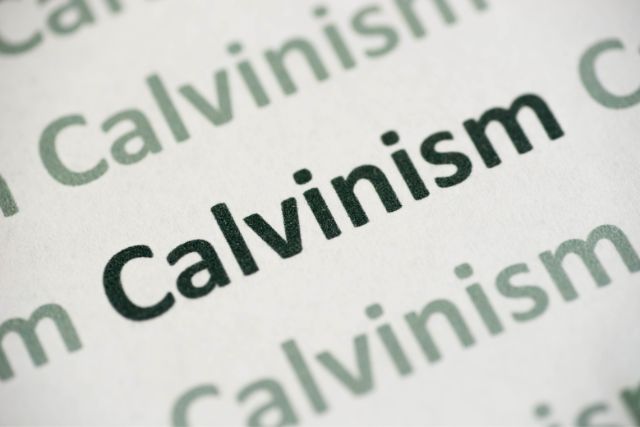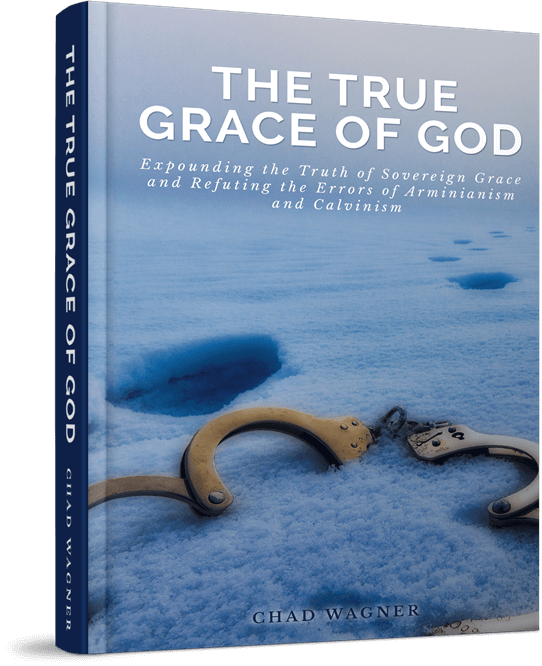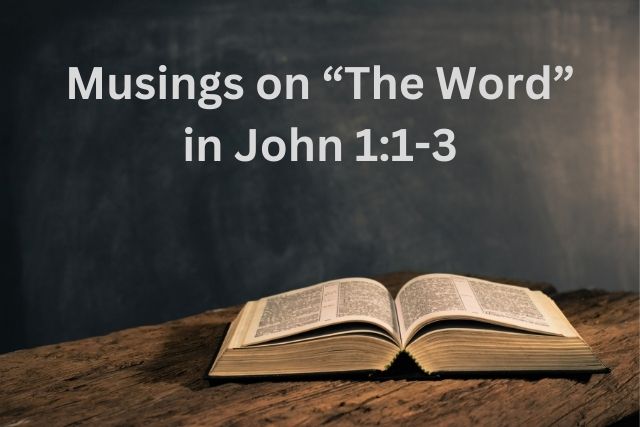The fundamental error of Calvinism is the misunderstanding of the nature of regeneration. Most Calvinists understand that regeneration precedes faith, and that regeneration is the sovereign act of God which enables a man to have faith in Christ. What they fail to understand is that regeneration is the act of giving the elect eternal life. Regeneration enables faith because it resurrects the dead spirit within him to new life. The new life given in regeneration is eternal life. Calvinists are correct in thinking that regeneration changes a man spiritually, giving him the ability to exercise faith, but they err in not understanding that the spiritual change of a man’s fallen nature is the passing from spiritual death unto spiritual (eternal) life. They fail to see that regeneration is eternal salvation. They instead think that regeneration imparts the gift of faith that, when exercised, is the means of eternal salvation and eternal life. They misunderstand faith to be the cause of eternal life, rather than the evidence of it.
What follows are quotes from Calvinists.
“Wherefore, they who are elected, being fallen in Adam, are redeemed by Christ, are effectually called unto faith in Christ by His Spirit working in due season, are justified, adopted, sanctified, and kept by His power, through faith, unto salvation.” [1] (emphasis mine)
“Man, by his fall, having made himself incapable of life by that covenant, the Lord was pleased to make a second, commonly called the covenant of grace; wherein He freely offereth unto sinners life and salvation by Jesus Christ; requiring of them faith in Him, that they may be saved, and promising to give unto all those that are ordained unto eternal life His Holy Spirit, to make them willing, and able to believe.” [2] (emphasis mine)
“The sovereignty of grace found expression in their (the Reformers) thinking at a profounder level still, in the doctrine of monergistic regeneration―the doctrine, that is, that the faith which receives Christ for justification is itself the free gift of a sovereign God, bestowed by spiritual regeneration in the act of effectual calling. To the Reformers, the crucial question was not simply, whether God justifies believers without works of law. It was the broader question, whether sinners are wholly helpless in their sin, and whether God is to be thought of as saving them by free, unconditional, invincible grace, not only justifying them for Christ’s sake when they come to faith, but also raising them from the death of sin by His quickening Spirit in order to bring them to faith.” [3] (emphasis mine)
“The Arminian says that the order of events is: First, Man’s work of faith, next, God’s gift of life. The Calvinist declares that the order of events is: First, God’s Gift of Life, then saving Faith.” [4] (underline mine)
“He (God) regenerated us when we were yet dead in sins. Faith, too, is His Gift. We are saved by means of faith “which is not of ourselves.” [5] (underline mine)
“God bestows his salvation by effecting faith through a preaching ministry sent into the world “to publish repentance to the sinner, and salvation, and that by Jesus Christ.”” [6] (emphasis mine)
“Those who are finally saved attend most energetically to such means of salvation as repentance, belief, and hearing the word, as well as the sincere pursuit of holiness.” [7] (emphasis mine)
“God’s precept is that the gospel should be preached to every creature, that all should repent and believe, and that salvation comes to all those and only those who do so.” [8] (emphasis mine)
“Only those who believe are actually saved.” [9]
“According to God’s secret will, or will of purpose, redemption is secured by the death of Christ to all the elect; according to his revealed will, it is secured to those only who believe.” [10] (emphasis mine)
“Dagg completes his trinitarian treatment of the sovereignty of grace by discussing the Holy Spirit’s work in effectual calling. His thesis: ‘The Holy Spirit effectually calls all the elect to repent and believe.’ There is an external call from the Holy Spirit to all who hear the gospel. But men resist and disobey this call of the Spirit, so it is often ineffectual. There is another call that is internal and effectual. ‘This always produces repentance and faith, and therefore secures salvation.’” [11] (emphasis mine)
“. . . although the choice is to a salvation attained through faith and sanctification . . .” [12] (emphasis mine)
“Gambrell comments that this represents God’s predestination: ‘It is wise in all its goings, selecting and making efficient all means leading to the end. “If a man is going to be saved he will be saved anyway,” is not true. He will be saved, but God’s way, not anyway. And God’s way is by the preaching of the gospel, which he has given command shall be preached to every creature. Through the preaching of the gospel he will take out of all nations a people for himself.’” [13] (emphasis mine)
“I entreat you, my dear friend and brother, to get it deeply impressed on your heart, that as (I believe) your real and sincere design is to save the souls of men from sin and eternal death, so it is the gospel of Christ which is the only instrument whereby you can ever hope to attain this blessed end;” [14] (emphasis mine)
“There is no merit in believing, for faith itself is a gift of God. God gives His people an inward working of the Spirit in order that they may believe, and faith is only the act of receiving the proffered gift. It is, then, only the instrumental cause, and not the meritorious cause, of salvation.” [15] (emphasis mine)
Regeneration is the imparting of eternal salvation and eternal life to the elect. Regeneration precedes faith and makes it possible. Therefore, faith is not, and cannot be, the means through which eternal salvation and eternal life are acquired. Let us prove each of these statements.
Regeneration is the imparting of eternal salvation and eternal life to the elect.
The scripture states that it is “not by works of righteousness which we have done, but according to his mercy he saved us, by the washing of regeneration, and renewing of the Holy Ghost” (Tit 3:5). This verse makes clear that regeneration is the means by which God saved His elect. To regenerate is “to cause to be born again in a spiritual sense; to invest with a new and higher spiritual nature.” Regenerate is a synonym of quicken, which means “to give or restore life to; to make alive.” Quickening/regeneration is the operation which God performs on His elect when they are spiritually dead in sin.
Eph 1:4 – According as he hath chosen us in him before the foundation of the world, that we should be holy and without blame before him in love:
Eph 2:1 – And you hath he quickened, who were dead in trespasses and sins;
The life that is given to the elect through regeneration is spiritual, eternal life.
Joh 10:28 – And I give unto them eternal life; and they shall never perish, neither shall any man pluck them out of my hand.
Joh 17:2 – As thou hast given him power over all flesh, that he should give eternal life to as many as thou hast given him.
Joh 5:25 – Verily, verily, I say unto you, The hour is coming, and now is, when the dead shall hear the voice of the Son of God: and they that hear shall live.
Quickening/regeneration is the giving of eternal salvation and eternal life by grace.
Eph 2:5 – Even when we were dead in sins, hath quickened us together with Christ, (by grace ye are saved;)
Failing to understand the essence of regeneration, Calvinists believe and teach that regeneration only enables the elect to believe, and once they exercise so-called “saving faith” they come into the possession of eternal life and are then eternally saved.
“The grace of faith, whereby the elect are enabled to believe to the saving of their souls, is the work of the Spirit of Christ in their hearts, and is ordinarily wrought by the ministry of the Word; by which also, and by the administration of baptism and the Lord’s supper, prayer, and other means appointed of God, it is increased and strengthened.” [16] (emphasis mine)
If they understood that regeneration is the imparting of eternal life and eternal salvation, Calvinists would not hold the contradictory beliefs that salvation is all of God but yet is acquired by man’s faith. This fundamental error likely has its roots in a faulty understanding of the purpose of the gospel and temporal salvation, each of which will be covered in subsequent chapters.
Regeneration precedes faith and makes it possible. Therefore, faith is not, and cannot be, the means through which eternal salvation and eternal life are acquired.
In the preceding pages it was established from scripture that regeneration is the direct and effectual cause of eternal salvation and eternal life. Regeneration and faith are entirely different things, so if regeneration is the source of eternal life and salvation, then faith cannot be. This truth is further proved by the fact that eternal life precedes faith. The Lord Jesus Christ declared that, “. . . He that heareth my word, and believeth on him that sent me, hath everlasting life, and shall not come into condemnation; but is passed from death unto life” (Joh 5:24). The grammar of this verse demands that eternal life (passing from death unto life) precedes faith; for believeth is in the present tense, while is passed is in the present perfect tense, which, as the reader will recall, denotes an action that happened in the past, the effects of which continue into the present. Jesus here plainly states that a person who presently believes has already passed from death to life.
In like manner, the scripture teaches that “whosoever believeth that Jesus is the Christ is born of God . . .” (1Jo 5:1). The grammar of this verse is slightly different than Joh 5:24, but the result is the same. Believeth is in the present tense, whereas is born is a past participle in the passive voice, which is grammatically equivalent to the present perfect tense. A man who believes that Jesus is the Christ does not become born of God, but rather is already born of God, just as a man who “doeth righteousness is born of him” (1Jo 2:29) and a man who “loveth is born of God” (1Jo 4:7). Neither doing righteousness, nor loving, nor believing cause one to be born of God; all three of these acts are evidences and effects of eternal life, not the causes of it.
Regeneration (the new birth / eternal life) precedes faith; therefore, faith cannot be the cause of the new birth and eternal life. This simple fact, when understood, will do much to alleviate the contradictions of Calvinism.
[1] Westminster Confession of Faith (1646), Chapter 3 – Of God’s Eternal Decree, Point 6.
[2] Ibid, Chapter 7 – Of God’s Covenant With Man, Point 3.
[3] R. C. Sproul, Willing to Believe (Grand Rapids, MI: Baker Book House Company, 1997), pp. 22-23. ― quoting from: J. I. Packer and O. R. Johnston, “Historical and Theological Introduction,” in Martin Luther, The Bondage of the Will, trans. J. I. Packer and O. R. Johnston (Cambridge: James Clarke / Westwood, N.J.: Revell, 1957), pp. 57-58.
[4] Duane Edward Spencer, TULIP (Grand Rapids, MI: Baker Book House Company, 1979), p. 13.
[5] Ibid, p. 27.
[6] Thomas J. Nettles, By His Grace and for His Glory (Grand Rapids, MI: Baker Book House Company, 1986), p. 41.
[7] Ibid, p. 172.
[8] Ibid, p. 175.
[9] Ibid.
[10] Ibid. ― quoting from: John L. Dagg, Manual of Theology (Harrisonburg, VA: The Southern Baptist Publication Society, 1857), p. 326.
[11] Ibid, p. 176 ― quoting from: John L. Dagg, Manual of Theology (Harrisonburg, VA: The Southern Baptist Publication Society, 1857), pp. 322, 331.
[12] Ibid, p. 198. ― quoting from: James P. Boyce, Abstract of Systematic Theology (Philadelphia, PA: Christian Gospel Foundation, 1887), p. 347.
[13] Ibid, p. 217. ― quoting from: J. B. Gambrell in Jeremiah B. Jeter, D.D., Baptist Principles Reset (Richmond, VA: The Religious Herald Co., 1902), p. 253.
[14] Isaac Watts, An Exhortation to Ministers (Swengel, PA: Reiner Publications, 1970), p. 13.
[15] Loraine Boettner, The Reformed Doctrine of Predestination (Philadelphia, PA: The Presbyterian and Reformed Publishing Co., 1977), p. 302.
[16] The Philadelphia Confession of Faith, Chapter 14: Of Saving Faith, paragraph 1, (Philadelphia, 1742), [https://www.alliancenet.org/the-philadelphia-confession-of-faith#14].
This blog post is an excerpt from my book, The True Grace of God. You can find out more about the book below.








